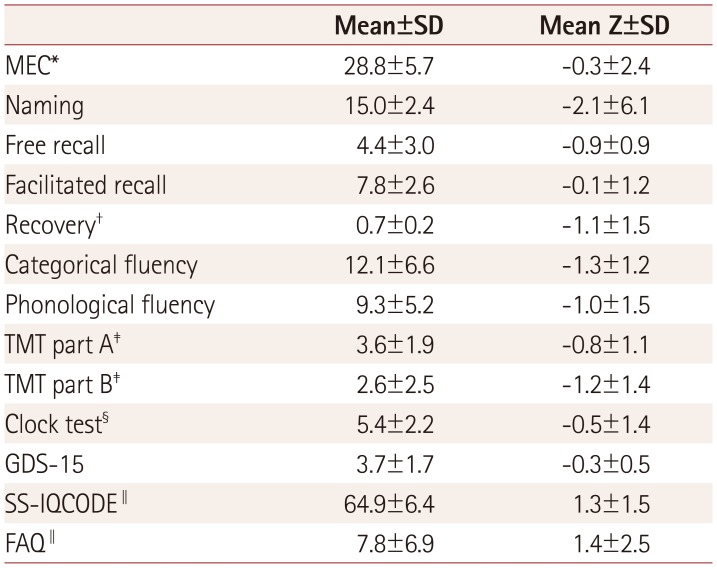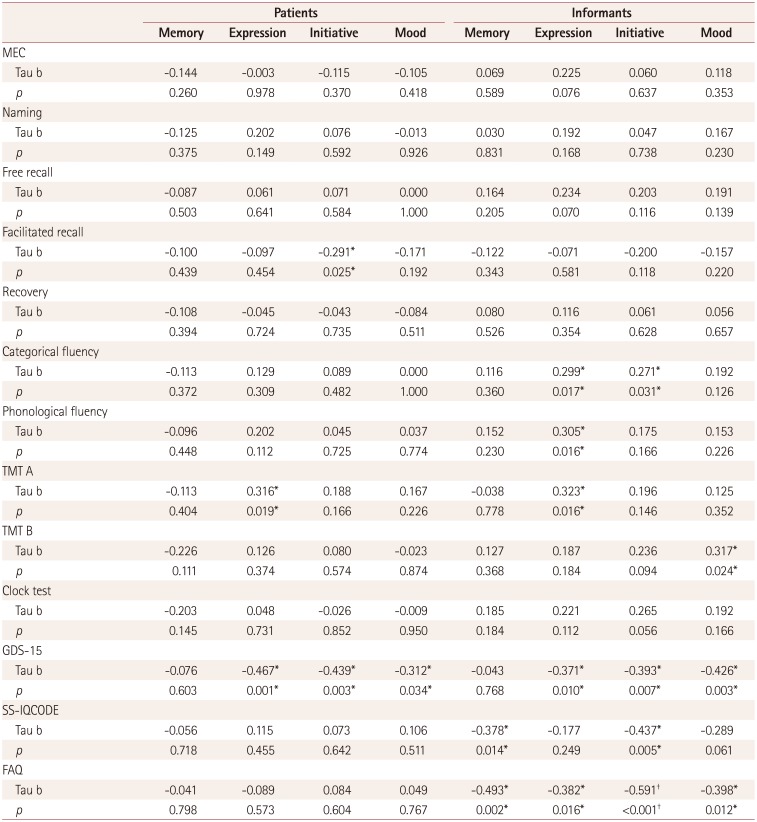1. Zamboni G, Wilcock G. Lack of awareness of symptoms in people with dementia: the structural and functional basis. Int J Geriatr Psychiatry. 2011; 26:783–792. PMID:
21744382.

2. Jorm AF, Christensen H, Henderson AS, Korten AE, Mackinnon AJ, Scott R. Complaints of cognitive decline in the elderly: a comparison of reports by subjects and informants in a community survey. Psychol Med. 1994; 24:365–374. PMID:
8084932.

3. Grut M, Jorm AF, Fratiglioni L, Forsell Y, Viitanen M, Winblad B. Memory complaints of elderly people in a population survey: variation according to dementia stage and depression. J Am Geriatr Soc. 1993; 41:1295–1300. PMID:
8227910.

4. Mitchell AJ. The clinical significance of subjective memory complaints in the diagnosis of mild cognitive impairment and dementia: a meta-analysis. Int J Geriatr Psychiatry. 2008; 23:1191–1202. PMID:
18500688.

5. Reid LM, Maclullich AM. Subjective memory complaints and cognitive impairment in older people. Dement Geriatr Cogn Disord. 2006; 22:471–485. PMID:
17047326.

6. Rouch I, Anterion CT, Dauphinot V, Kerleroux J, Roche F, Barthelemy JC, et al. Cognitive complaints, neuropsychological performance and affective disorders in elderly community residents. Disabil Rehabil. 2008; 30:1794–1802. PMID:
18608410.

7. Slavin MJ, Brodaty H, Kochan NA, Crawford JD, Trollor JN, Draper B, et al. Prevalence and predictors of “subjective cognitive complaints” in the Sydney Memory and Ageing Study. Am J Geriatr Psychiatry. 2010; 18:701–710. PMID:
21491631.

8. Argimón Pallás JM, Jiménez Villa J. Métodos de Investigación Clĺnica y Epidemiológica. 2nd ed. Madrid: Harcourt;1999.
9. Lobo A, Ezquerra J, Gómez Burgada F, Sala JM, Seva Dĺaz A. [Cognocitive mini-test (a simple practical test to detect intellectual changes in medical patients)]. Actas Luso Esp Neurol Psiquiatr Cienc Afines. 1979; 7:189–202. PMID:
474231.
10. del Ser T, Sánchez-Sánchez F, García de, Otero A, Munoz DG. Validation of the seven-minute screen neurocognitive battery for the diagnosis of dementia in a Spanish population-based sample. Dement Geriatr Cogn Disord. 2006; 22:454–464. PMID:
16988506.

11. Butman J, Allegri RF, Harris P, Drake M. [Spanish verbal fluency. Normative data in Argentina]. Medicina (B Aires). 2000; 60(5 Pt 1):561–564. PMID:
11188892.
12. Tombaugh TN. Trail Making Test A and B: normative data stratified by age and education. Arch Clin Neuropsychol. 2004; 19:203–214. PMID:
15010086.

13. Martĺnez de la Iglesia J, Onĺs Vilches MC, Dueñas Herrero R, Aguado Taberné C, Albert Colomer C, Arias Blanco MC. [Abbreviating the brief. Approach to ultra-short versions of the Yesavage questionnaire for the diagnosis of depression]. Aten Primaria. 2005; 35:14–21. PMID:
15691450.
14. Morales JM, Gonzalez-Montalvo JI, Bermejo F, Del-Ser T. The screening of mild dementia with a shortened Spanish version of the “Informant Questionnaire on Cognitive Decline in the Elderly”. Alzheimer Dis Assoc Disord. 1995; 9:105–111. PMID:
7662322.

15. Pfeffer RI, Kurosaki TT, Harrah CH Jr, Chance JM, Filos S. Measurement of functional activities in older adults in the community. J Gerontol. 1982; 37:323–329. PMID:
7069156.

16. Hänninen T, Reinikainen KJ, Helkala EL, Koivisto K, Mykkänen L, Laakso M, et al. Subjective memory complaints and personality traits in normal elderly subjects. J Am Geriatr Soc. 1994; 42:1–4. PMID:
8277103.

17. Jungwirth S, Fischer P, Weissgram S, Kirchmeyr W, Bauer P, Tragl KH. Subjective memory complaints and objective memory impairment in the Vienna-Transdanube aging community. J Am Geriatr Soc. 2004; 52:263–268. PMID:
14728638.

18. Mendes T, Ginó S, Ribeiro F, Guerreiro M, de Sousa G, Ritchie K, et al. Memory complaints in healthy young and elderly adults: reliability of memory reporting. Aging Ment Health. 2008; 12:177–182. PMID:
18389397.

19. Buckley R, Saling MM, Ames D, Rowe CC, Lautenschlager NT, Macaulay SL, et al. Factors affecting subjective memory complaints in the AIBL aging study: biomarkers, memory, affect, and age. Int Psychogeriatr. 2013; 25:1307–1315. PMID:
23693133.

20. Balash Y, Mordechovich M, Shabtai H, Giladi N, Gurevich T, Korczyn AD. Subjective memory complaints in elders: depression, anxiety, or cognitive decline? Acta Neurol Scand. 2013; 127:344–350. PMID:
23215819.

21. Snitz BE, Morrow LA, Rodriguez EG, Huber KA, Saxton JA. Subjective memory complaints and concurrent memory performance in older patients of primary care providers. J Int Neuropsychol Soc. 2008; 14:1004–1013. PMID:
18954480.

22. Elfgren C, Gustafson L, Vestberg S, Passant U. Subjective memory complaints, neuropsychological performance and psychiatric variables in memory clinic attendees: a 3-year follow-up study. Arch Gerontol Geriatr. 2010; 51:e110–e114. PMID:
20211500.

23. Bassett SS, Folstein MF. Memory complaint, memory performance, and psychiatric diagnosis: a community study. J Geriatr Psychiatry Neurol. 1993; 6:105–111. PMID:
8512626.

24. Jonker C, Launer LJ, Hooijer C, Lindeboom J. Memory complaints and memory impairment in older individuals. J Am Geriatr Soc. 1996; 44:44–49. PMID:
8537589.

25. Schmand B, Jonker C, Geerlings MI, Lindeboom J. Subjective memory complaints in the elderly: depressive symptoms and future dementia. Br J Psychiatry. 1997; 171:373–376. PMID:
9373429.

26. Wang PN, Wang SJ, Fuh JL, Teng EL, Liu CY, Lin CH, et al. Subjective memory complaint in relation to cognitive performance and depression: a longitudinal study of a rural Chinese population. J Am Geriatr Soc. 2000; 48:295–299. PMID:
10733056.

27. Lam LC, Lui VW, Tam CW, Chiu HF. Subjective memory complaints in Chinese subjects with mild cognitive impairment and early Alzheimer's disease. Int J Geriatr Psychiatry. 2005; 20:876–882. PMID:
16116581.

28. Jonker C, Geerlings MI, Schmand B. Are memory complaints predictive for dementia? A review of clinical and population-based studies. Int J Geriatr Psychiatry. 2000; 15:983–991. PMID:
11113976.

29. Jorm AF, Christensen H, Korten AE, Jacomb PA, Henderson AS. Memory complaints as a precursor of memory impairment in older people: a longitudinal analysis over 7-8 years. Psychol Med. 2001; 31:441–449. PMID:
11305852.

30. Wang L, van Belle G, Crane PK, Kukull WA, Bowen JD, McCormick WC, et al. Subjective memory deterioration and future dementia in people aged 65 and older. J Am Geriatr Soc. 2004; 52:2045–2051. PMID:
15571540.

31. Waldorff FB, Siersma V, Vogel A, Waldemar G. Subjective memory complaints in general practice predicts future dementia: a 4-year follow-up study. Int J Geriatr Psychiatry. 2012; 27:1180–1188. PMID:
22253004.

32. Kryscio RJ, Abner EL, Cooper GE, Fardo DW, Jicha GA, Nelson PT, et al. Self-reported memory complaints: implications from a longitudinal cohort with autopsies. Neurology. 2014; 83:1359–1365. PMID:
25253756.

33. Purser JL, Fillenbaum GG, Wallace RB. Memory complaint is not necessary for diagnosis of mild cognitive impairment and does not predict 10-year trajectories of functional disability, word recall, or short portable mental status questionnaire limitations. J Am Geriatr Soc. 2006; 54:335–338. PMID:
16460388.

34. Gallassi R, Bisulli A, Oppi F, Poda R, Di Felice C. Subjective cognitive complaints, neuropsychological performance, affective and behavioural symptoms in non-demented patients. Int J Geriatr Psychiatry. 2008; 23:95–101. PMID:
17879254.

35. Carr DB, Gray S, Baty J, Morris JC. The value of informant versus individual's complaints of memory impairment in early dementia. Neurology. 2000; 55:1724–1726. PMID:
11113230.

36. Watson LC, Lewis CL, Fillenbaum GG. Asking family about memory loss. Is it helpful? J Gen Intern Med. 2005; 20:28–32. PMID:
15693924.
37. Hjermstad MJ, Fayers PM, Haugen DF, Caraceni A, Hanks GW, Loge JH, et al. Studies comparing Numerical Rating Scales, Verbal Rating Scales, and Visual Analogue Scales for assessment of pain intensity in adults: a systematic literature review. J Pain Symptom Manage. 2011; 41:1073–1093. PMID:
21621130.







 PDF
PDF ePub
ePub Citation
Citation Print
Print


 XML Download
XML Download